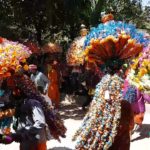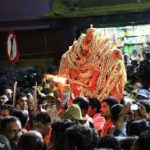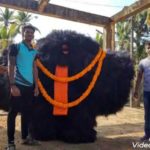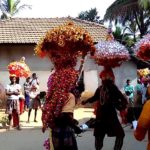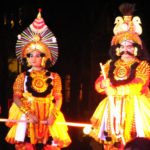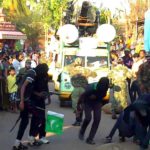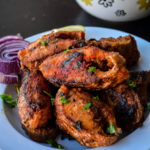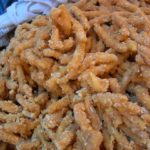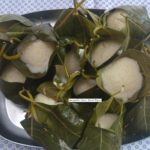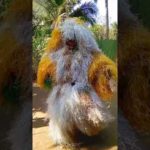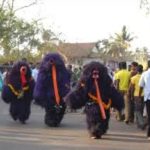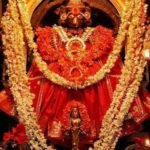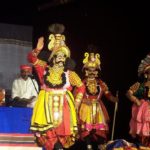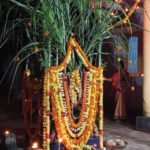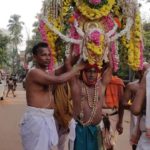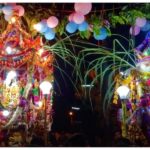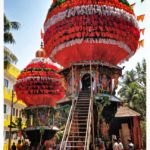culture and traditions
Ankola’s population includes diverse communities. The Nadavar(ನಾಡವರ), Namadhari (ನಾಮಧಾರಿ ), Komarpanta (ಕೋಮಾರಪಂತ), Gabith (ಗಾಬಿತ), Harikanth (ಹರಿಕಾಂತ) are the major communities. The main languages spoken are Kannada and partially Konkani language. Among the Muslims, Urdu is common.
Bandihabba (ಬಂಡಿ ಹಬ್ಬ)
The Bandihabba celabrated on the occasion of Buddha Poornima in the month of May in the premises of Shri Shantadurga Temple which attracts people near by towns and villages. This is the event where the people who migrated to different cities for livelihood will not miss this to meet their relatives and pray for the god. The surrounding villages Agragon, Kogre, Honnebail, Hichkad and few others villages celebrate Bandihabba during same period. Click here to watch video.
Kathik (ಕಾರ್ತಿಕ)
This is the one most popular festival celebrated in the month of November wherie deities of all the temples in Ankola will be carries on a palaqui.
Tulsi Habba (ತುಳಸಿ ಹಬ್ಬ)
Tulasi Vivaha is the ceremonial marriage of the Tulasi or commonly Tulsi plant to the Hindu god Shaligram or Vishnu or to his avatar, Sri Krishna. The Tulsi wedding signifies the end of the monsoon and the beginning of the wedding season in Hinduism
Hostu(ಹೊಸ್ತು )
Hostu Habba is celebrated across the hindu communities. The new paddy crop is brought from the temple owned paddy field. Then it worshiped and distributed to all. Its practice in this area, after offering the paddy crop to the temple “Kalasha Devaru”the farmers will start harvesting with the blessing of Bhoomata.
Dahikaala (ದಹಿಕಾಲ)
The Dahikaala (ದಹಿಕಾಲ) festival in Ankola as in Dahi Handi of Maharashtra celebrates the playful and mischievous side of Krishna, where teams of young men form human pyramids to reach a high-hanging pot of butter and break it. This festival is very much important to the Namadharis of Ankola in particular and the teams usually are of Namadhari youth by tradition. Click here to watch video.
Suggi Kunitha (ಸುಗ್ಗಿ ಕುಣಿತ)
Suggi kunitha a local seasonal folk dance, has begun in the coastal taluks of Uttara Kannada district. The troupes of the Suggi dancers move from one village to another during the paddy harvest season till the festival of “Holi” to perform the dance as a gratitude to the God for the successful harvest.
The Suggi dancers wear traditional dresses and headgears. The dance has historical background as it was used to create awareness among the masses against the British rule during the Independence movement. Karadi vesha (ಕರಡಿ ವೇಷ) the costume which they wear during this even is special. Click here to watch the video.
Yakshagana (ಯಕ್ಷಗಾನ)
A popular folk dance in Ankola is Yakshagana.
Cuisine (ಆಹಾರ ಪದ್ಧತಿ)
Usual diet contains boiled white rice (called Kuchige akki) and fish, basale soppina hulaga (a vegetable sambar) & Koli Asi (chicken curry) (ಕೋಳೀ ಆಶಿ). Fish is consumed by a large part of population. Special Preparations – 1. Kotte Roti (ಕೊಟ್ಟೆ ರೊಟೀ) – A form of idli-like preparation, steam cooked in a conical shaped container constructed using jackfruit leaves.
Kajmiji is a local sweet and you can find all the hindu community utsava (ಉತ್ಸವ) or event.
Some more details on the culture you can visit facebook page Ankola – Culture and History
